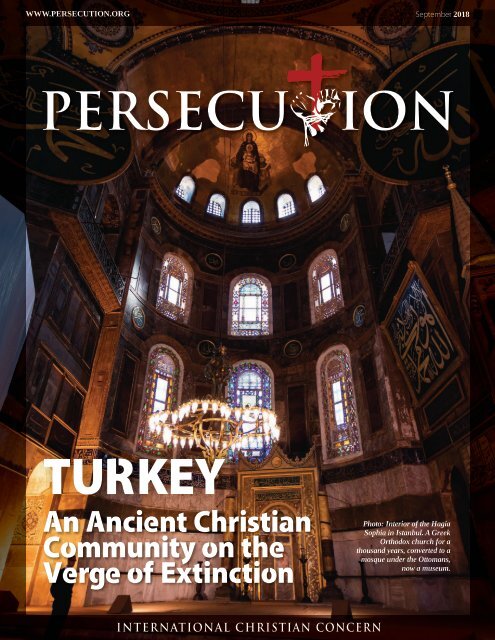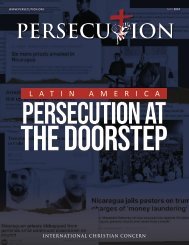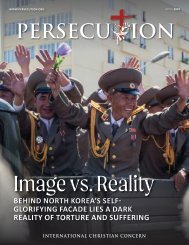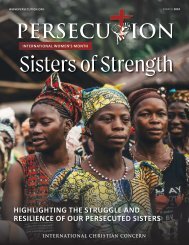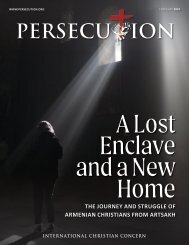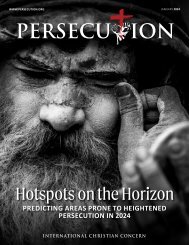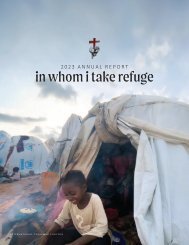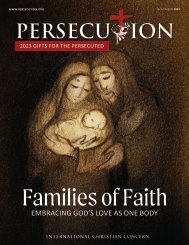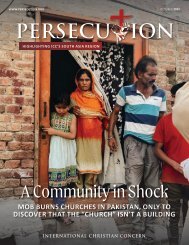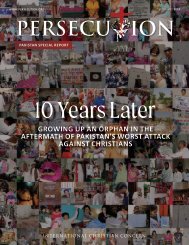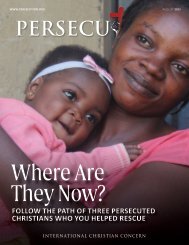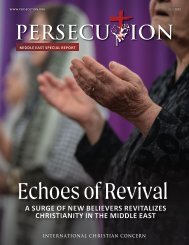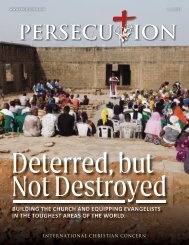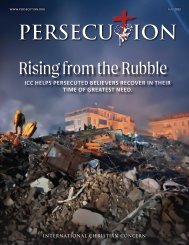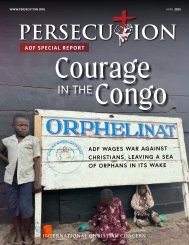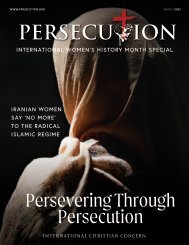September 2018 Persecution Magazine
Create successful ePaper yourself
Turn your PDF publications into a flip-book with our unique Google optimized e-Paper software.
WWW.PERSECUTION.ORG<br />
<strong>September</strong> <strong>2018</strong><br />
PERSECU ION<br />
TURKEY<br />
An Ancient Christian<br />
Community on the<br />
Verge of Extinction<br />
PERSECU ION.org<br />
INTERNATIONAL CHRISTIAN CONCERN<br />
Photo: Interior of the Hagia<br />
Sophia in Istanbul. A Greek<br />
Orthodox church for a<br />
thousand years, converted to a<br />
mosque under the Ottomans,<br />
now a museum.
In This Issue<br />
FEATURES<br />
14 | Once the Birthplace of the Church,<br />
Now an Enemy<br />
A historic overview of Turkey’s relationship with<br />
the Church and its persecution of Christians.<br />
16 | President Erdoğan’s Rise Signals<br />
Trouble for Christians<br />
Erdoğan has transformed Turkey more than any<br />
other leader, with dire implications for Christians.<br />
18 | The Systematic Eradication of<br />
Christian Civilization in Turkey<br />
A Turkish Muslim journalist decries her country’s<br />
long history of mistreating Christians.<br />
20 | Turkey’s Young Christians Feel the<br />
Spiritual Darkness in Their Land<br />
Turkish believers wrestle with the entrenched cultural<br />
belief that real Turks are and must be Muslim.<br />
22 | Fear Will Not Define Us<br />
A Turkish pastor and his church navigate threats<br />
and tragedy at the hands of their government<br />
and fellow countrymen.<br />
26 | Creating the Christian Other<br />
Turkey’s leaders have used uncontested<br />
and consistent anti-Christian hate speech to<br />
erase 2,000 years of Christian history, turning<br />
Christians into a marginalized community.<br />
28 | ICC’s Communal Farms Underway<br />
Two of the 10 communal farms ICC is creating<br />
for survivors of Fulani militant attacks are up<br />
and running.<br />
Regular Features<br />
3 Letter from the President<br />
A few words from ICC’s president, Jeff<br />
King, on the millennia-old Christian<br />
tradition in Turkey and the threats it<br />
faces today.<br />
4 World News<br />
A snapshot of the persecution that<br />
impacts our brothers and sisters daily, in<br />
every corner of the world.<br />
8 Your Dollars at Work<br />
Learn how your gifts are providing<br />
comfort, relief, Bibles, education and<br />
vocational training to the persecuted.<br />
12 West Watch<br />
Faith under siege in the West.<br />
14<br />
18<br />
26<br />
16<br />
22<br />
28<br />
2 PERSECU ION.org<br />
SEPTEMBER <strong>2018</strong><br />
INTERNATIONAL CHRISTIAN CONCERN
“The (Muslim call to prayer) is no longer<br />
heard. The cross has been erected on (the<br />
mosque pulpit). The kafir (derogatory term for<br />
non-Muslims) has flown his flag on mosques, on<br />
everywhere. Come, my brother, join our hands<br />
altogether. Let’s explode the bombs and silence<br />
the [church] bells everywhere.”<br />
Jeff King, President<br />
International Christian Concern<br />
—Naci Agbal, President Erdoğan’s Minister<br />
of Finance, quoting a poem about the<br />
extermination of over one million Syrian and<br />
Turkish Christians in the 20th century.<br />
While on a trip to Turkey in 2002, I was blown away by<br />
the impression that I was taking a walk through the New<br />
Testament! Churches founded around 300 A.D., carved out of<br />
the side of a mountain were still accessible to the public (search<br />
YouTube for “The Centuries-Old Cave Churches of Turkey”).<br />
In fact, most of the churches featured in the book of Acts were<br />
founded in Turkey, and I visited their remains.<br />
I find Derinkuyu to be a fitting metaphor for modern Turkey.<br />
A massive underground city that housed up to 20,000 people,<br />
Derinkuyu can still be visited today. Christians hid here<br />
to defend themselves from the early Muslim jihadists, and<br />
centuries later, Mongolian invaders. The remnant of the Church<br />
in Turkey is living in a hostile environment, driven into hiding<br />
from the Muslim caliphate’s violent attacks once again.<br />
As many of today’s Turks have discovered, the story of modern<br />
Turkey unfortunately revolves around President Erdoğan. In<br />
less than two decades, he has changed the course of the nation.<br />
Turkey has gone from being one of the few existing Muslim<br />
democracies to Erdoğan’s personal fiefdom. He has removed<br />
all opposition and sits as dictator for life.<br />
Erdoğan is a complex and wily character, as well as a true<br />
Islamist at heart. As a young man, he was the head of the youth<br />
branch of an Islamist political party. In 1976, he assumed a<br />
position of leadership at a local youth branch of the Islamist<br />
National Salvation Party (MSP). Erdoğan became the district<br />
chair of the Islamist Welfare Party in 1984, and the next year,<br />
chair of the party’s Istanbul city branch.<br />
In 1999, he was jailed for four months (out of a 10-month sentence,<br />
served in luxurious accommodations) and banned from politics for<br />
life for stirring up religious hatred after quoting the following poem:<br />
“The mosques are our barracks, the domes our helmets, the<br />
minarets our bayonets, and the believers our soldiers.”<br />
PERSECU ION.org<br />
INTERNATIONAL CHRISTIAN CONCERN<br />
Erdoğan co-founded the Islamist-rooted Justice and<br />
Development Party (AKP) in August 2001, and he became<br />
prime minister of Turkey in 2003.<br />
Erdoğan has consolidated power and removed all threats<br />
to his rule since he assumed the role of prime minister. He<br />
has gradually and deliberately steered the country toward<br />
fundamentalism, and his Islamist core has become more<br />
evident as his control has increased.<br />
Ominously, in 2016, his finance minister quoted another poem<br />
that lifted up the killing of over one million Syrian and Turkish<br />
Christians in the early 1900s:<br />
“The (Muslim call to prayer) is no longer heard. The<br />
cross has been erected on (the mosque pulpit). The kafir<br />
(derogatory term for non-Muslims) has flown his flag on<br />
mosques, on everywhere. Come, my brother, join our hands<br />
altogether. Let’s explode the bombs and silence the [church]<br />
bells everywhere.”<br />
Unfortunately, there is no modern-day refuge like<br />
Derinkuyu for Christians to weather the storm of Erdoğan<br />
and Turkey’s slog toward Islamic radicalism. The Turkish<br />
Church is facing incredible pressure.<br />
Even so, I urge you not to despair. The march of the Gospel<br />
is unstoppable. It does not advance by sword or bullet, but by<br />
the unstoppable attractiveness of Jesus. We will continue to<br />
lift Him up in Turkey and elsewhere on the front lines of the<br />
spiritual battle.<br />
Please join us as we bandage and build the persecuted Church.<br />
As always, your donations will be used efficiently, effectively,<br />
and ethically.<br />
Jeff King<br />
3
Over 230 Killed in Suspected Fulani<br />
Militant Attack<br />
1 | NIGERIA A series of recent attacks on villages near Jos,<br />
Nigeria left more than 230 Christians dead. The attacks<br />
took place in the villages of Xland, Gindin Akwati, Ruku,<br />
Nghar, Kura Falls, Kakuruk, Rakok, Kok, and Razat. All<br />
of these villages are in the districts of Gashish and Ropp<br />
in the Barkin Ladi Local Government Area.<br />
It is believed that Fulani militants were responsible<br />
for the attacks, which were directed toward the<br />
predominantly Berom villagers. Some reports claim<br />
that the string of attacks was a brutal act of retaliation<br />
after Berom farmers killed five Fulani herdsmen. The<br />
militants carried out the attacks ruthlessly, attacking<br />
men, women, and children alike with machetes and guns.<br />
1<br />
4 6<br />
2 3 5<br />
The youngest known<br />
victim was a threemonth-old<br />
baby boy.<br />
Authorities initially<br />
reported that 86 individuals<br />
were killed in<br />
the attacks. However,<br />
an ICC representative<br />
who assisted with the<br />
body recovery efforts<br />
confirmed that the<br />
death tolls were much<br />
higher than what<br />
police first reported.<br />
One resident reported<br />
that at least 70 were<br />
killed in the village of<br />
Nghar alone, and that<br />
the village had been<br />
reduced to rubble.<br />
In response to the<br />
tragedy, President<br />
Muhammadu Buhari<br />
released a statement<br />
reading, “The grievous<br />
loss of lives and<br />
property arising from<br />
the killings in Plateau<br />
is painful and regrettable.<br />
My deepest condolences<br />
to the affected<br />
communities. We<br />
will not rest until all<br />
murderers and criminal<br />
elements and their<br />
sponsors are incapacitated<br />
and brought to<br />
justice.” However,<br />
others have criticized<br />
Buhari for his apparent<br />
indifference after<br />
he reportedly told a<br />
post-attack gathering<br />
of leaders that “the<br />
Fulani are known to<br />
be peaceful and carry<br />
stick, but are not<br />
known to have guns.”<br />
News<br />
“Sadly, the<br />
unwarranted arrest<br />
of Christians is a<br />
widespread problem<br />
in Eritrea.”<br />
Pastor in Eritrea Released After<br />
Decade in Prison<br />
2 | ERITREA After spending more than a decade in<br />
Eritrea’s notorious prison system, Pastor Oqbamichel<br />
Haiminot has been released. Pastor Oqbamichel was<br />
the first senior pastor to be arrested and held following<br />
the crackdown on religion in Eritrea in 2002. Though<br />
he was only held for a brief period of time after his<br />
initial arrest in 2003, he was frequently harassed and<br />
rearrested by authorities over the next several years. In<br />
2007, he was arrested and sent to jail for more than 10<br />
years, in spite of the fact that no charges were ever filed<br />
against him.<br />
Sadly, the unwarranted arrest of Christians is a<br />
widespread problem in Eritrea. Last year, over 200<br />
Christians were arrested without any charges. This<br />
reality is worsened by the horrendous conditions that<br />
Eritrean prisoners experience. Many prisoners are held<br />
either in shipping containers in the desert or underground<br />
jail cells. The prison cells are cramped, dirty,<br />
subject to extreme temperature changes, and prisoners<br />
are only allowed outside once or twice a day to use the<br />
restroom. Reports indicate that Pastor Oqbamichel is in<br />
need of medical assistance due to health problems that<br />
arose from his treatment in prison.<br />
4 PERSECU ION.org<br />
SEPTEMBER <strong>2018</strong><br />
INTERNATIONAL CHRISTIAN CONCERN
Vietnam Releases, Expels Christian Human Rights Lawyer to Germany<br />
3 | VIETNAM On June 7, Christian human rights lawyer Nguyen Van Dai and a fellow member of the Brotherhood for Democracy, Le Thu Ha,<br />
were released from a Vietnamese prison. The men were also expelled from Vietnam and flew to Germany shortly after their release. Dai began<br />
his human rights work in 2000, when he defended a believer after authorities violated her right to freely worship. He has since been targeted for<br />
arrest on several occasions by the Vietnamese authorities.<br />
Five Christian NGO-Workers Kidnapped and<br />
Raped in India<br />
4 | INDIA In mid-June, five Christian charity workers were kidnapped<br />
at gunpoint and gang-raped in India. At the time of the kidnapping,<br />
the women were leading a skit to raise awareness about human trafficking<br />
in the region. At the time of writing, police are investigating<br />
the incident as they await the results of the victims’ medical tests.<br />
Unfortunately, attacks of this nature have been ongoing in India in<br />
recent years as persecution continues to rise.<br />
Authorities Arrest Missionary, Bar Two Others<br />
from Leaving the Phillippines<br />
5 | PHILIPPINES In May, authorities in the Philippines arrested a<br />
Christian missionary, originally from Zimbabwe. They also barred two<br />
other missionaries, originally from the United States, from leaving the<br />
Philippines. The missionaries were also informed that they were placed<br />
on a government “watch list.” This has led to international outrage and<br />
a campaign calling for their release though prayer, a petition, and the<br />
use of the hashtag #LetThemLeave on social media.<br />
Hindu Leader in Nepal Fakes Assassination Attempt<br />
To Incite Violence Against Christians<br />
6 | NEPAL On April 8, a Hindu nationalist leader known as Acharya Shree Niwas<br />
instructed one of his followers to shoot him in the arm. Christians throughout<br />
Nepal claim that he did so in order to falsely blame local Christians for an<br />
assassination attempt and evoke communal violence. The shooting took place<br />
shortly before Niwas was set to speak at a major religious gathering.<br />
Following his stay in the hospital, Niwas was arrested and charged with staging<br />
the shooting and attempting to incite communal violence. Madhav Chaudhary,<br />
Niwas’s bodyguard who was responsible for shooting him, was also arrested and<br />
confessed his responsibility for the crime. While the authorities provided minimal<br />
comment since the investigation is ongoing, the chief district officer noted that<br />
Niwas will likely be tried for possession of firearms regardless of his intentions.<br />
PERSECU ION.org<br />
INTERNATIONAL CHRISTIAN CONCERN<br />
5
1<br />
6<br />
5<br />
2 4<br />
3<br />
News<br />
“The authorities accused<br />
the church members of<br />
participating in illegal<br />
activities and demanded<br />
that they cease such<br />
activities.”<br />
Christians Prepare for Reconciliation<br />
Session Following Mob Attack<br />
1 | EGYPT On July 7, a mob of radical Muslims formed<br />
in Egypt’s Minbal village and attacked several Christian<br />
homes. Leading up to the attack, Islamic extremists<br />
accused a local Coptic Christian, Abdo Adel Bebawy, of<br />
insulting Islam on social media. He was arrested the following<br />
day, July 6, and a mob attacked the wider Christian<br />
community the day after that, July 7.<br />
In response to the attack, a local Christian woman<br />
reported, “The mob stoned the houses of all the Christians<br />
[in Minbal]. The Christians were afraid and all locked<br />
themselves in their houses and closed the wooden shutters<br />
of the windows.”<br />
Another villager noted, “There is now negotiation (a<br />
reconciliation session) with Abdo Adel Bebawy and his<br />
family. They (Muslims) want to displace them out of<br />
the village.” Such reconciliation sessions have become a<br />
common practice in Egypt. These out-of-court settlements<br />
pressure Christians into giving up their legal rights, while<br />
their assailants often avoid punishment for their crimes.<br />
Believers who participate in these sessions often relinquish<br />
their rights in hopes of placating their attackers and<br />
avoiding further violence.<br />
A Coptic lawyer shared with ICC, “Sectarian strife and<br />
the assault on the Copts are being dealt with illegally<br />
because security is pressing for stability. The government<br />
does not want the press to speak about it or publish<br />
stories about it.”<br />
Iranian<br />
Authorities<br />
Arrest Christian<br />
Convert<br />
2 | IRAN Iranian<br />
authorities recently<br />
continued their campaign<br />
of persecution<br />
by arresting a<br />
Christian convert<br />
and father of three<br />
named Mohammadali<br />
Yassaghi. Yassaghi<br />
converted from Islam<br />
to Christianity over<br />
20 years ago and was<br />
accused of “spreading<br />
propaganda against<br />
the establishment.”<br />
His arrest follows the<br />
upholding of lengthy<br />
prison sentences of<br />
four other believers<br />
who were arrested<br />
on similar charges,<br />
including “acting<br />
against national security”<br />
by “promoting<br />
Zionist Christianity.”<br />
Although the Iranian<br />
constitution recognizes<br />
Christians’ religious<br />
rights on the books,<br />
this is not the case<br />
in reality. Christian<br />
leaders, particularly<br />
Christian converts, are<br />
often targeted by the<br />
authorities for nothing<br />
more than practicing<br />
their faith.<br />
Church in Henan Province Raided<br />
by Local Authorities<br />
3 | CHINA On May 22, a group of officials from<br />
several different government agencies raided<br />
Gusui Church in China’s Henan province. The<br />
authorities accused the church members of participating<br />
in illegal activities and demanded that<br />
they cease such activities. The officials also<br />
entered the church’s conference room without a<br />
warrant, took photos of the property, and took<br />
notes regarding several church members’ ID<br />
cards. Worse still, several congregants, including<br />
the speaker on the day of the raid, were arrested.<br />
In early June, one of the church leaders completed<br />
an application to review the ban on the<br />
church’s meeting place. The application also<br />
requested an investigation into the officials’<br />
illegal actions during the raid. In spite of the<br />
government’s actions, the church maintains that<br />
its congregants are law-abiding citizens who<br />
have not done anything to warrant the raid. They<br />
believe that they are being specifically targeted<br />
in violation of the Chinese constitution which<br />
allows for religious freedom.<br />
Since the government enacted a set of stricter<br />
religious regulations in February, Christians living<br />
in Henan province have felt the repercussions.<br />
However, despite the growing religious<br />
crackdown, the Church continues to flourish<br />
throughout China.<br />
6 PERSECU ION.org<br />
SEPTEMBER <strong>2018</strong><br />
INTERNATIONAL CHRISTIAN CONCERN
Two More Christians Die in Pakistan’s Unsafe<br />
Sewer System<br />
4 | PAKISTAN Two Christian men, Saqib Masih and Mushtaq Masih,<br />
recently died while attempting to unblock a sewer in Pakistan without<br />
adequate safety gear. As a result of widespread discriminatory hiring<br />
policies, Christians in Pakistan are often forced to accept notoriously<br />
dirty and unsafe jobs in the sanitation industry. Although Christians<br />
make up less than 2% of Pakistan’s total population, they comprise<br />
over 80% of the nation’s sewer workers. Unsafe working conditions<br />
and abuse run rampant in these positions, which has led to several<br />
deaths in <strong>2018</strong>.<br />
Students and Church in Russia Punished for<br />
Worship Videos<br />
5 | RUSSIA Two students have been fined and ordered for deportation<br />
from Russia for appearing in or sharing videos of church worship<br />
services. Authorities also issued the church, Jesus Embassy Church,<br />
several fines for a variety of charges, including “conducting<br />
missionary activity.” Since the implementation of so-called antimissionary<br />
laws in the summer of 2016, Christians in Russia have<br />
faced increasing restrictions on their right to share their faith as well<br />
as practice their own faith without being under the government’s<br />
watchful eye.<br />
Iraqi Christians Fearful that New Tax Signals Upcoming<br />
<strong>Persecution</strong><br />
6 | IRAQ On January 23, the Kurdish Regional Government (KRG) issued<br />
an order that business owners in Ankawa would be charged a fee when<br />
renewing their license. However, the order was not applied until a few<br />
months later in June. Ankawa is a predominantly Christian neighborhood<br />
in the Iraqi city of Erbil.<br />
Ankawa Today confirmed the discriminatory nature of the tax by noting<br />
that the tax is exclusively being imposed in Ankawa, excluding other<br />
Kurdish towns. They also noted that the tax is being implemented in another<br />
predominantly Christian town in northern Iraq called Semel. Many local<br />
Christians worry that this tax is a warning sign of looming persecution, as<br />
the “jizya” tax was used against religious minorities during the reign of ISIS.<br />
Authorities must take the necessary steps to ensure that Christians receive<br />
equal treatment in order to avoid instilling a culture of discrimination.<br />
PERSECU ION.org<br />
INTERNATIONAL CHRISTIAN CONCERN<br />
7
Your Dollars a<br />
ICC Funds<br />
Schooling for<br />
Martyrs’ Kids<br />
Suffering Wives & Children<br />
Fulani militants invaded a Christian village<br />
in Ancha in Miango District of<br />
Plateau State, Nigeria in the early hours<br />
of <strong>September</strong> 8, 2017. Twenty people<br />
were killed in a gruesome manner and<br />
five suffered various injuries. Nineteen<br />
of the murdered victims were members<br />
of Salama Baptist Church and one was a<br />
member of a local Methodist church. One<br />
family was completely wiped out with no<br />
succeeding generations left. The entire<br />
church, including the pastor, was traumatized<br />
and needed spiritual, emotional, and<br />
physical encouragement.<br />
In order to alleviate some of the burden on<br />
the shoulders of this community, ICC provided<br />
funds for eight of the children whose<br />
parents were killed to continue their education.<br />
Rev. Andrew Okebe, Zonal Chairman at<br />
the Christian Association of Nigeria (CAN),<br />
said, “This assistance will encourage them<br />
and build their faith. They don’t know what<br />
will happen next, but this is raising a hope<br />
that better things are coming.”<br />
Rev. Nanchwat Laven, the minister of<br />
Salama Baptist Church in Ancha Village,<br />
said, “When this attack happened, only God<br />
knows why. We were quite distressed. We<br />
are thankful for all those who showed concern,<br />
including [ICC’s representative] who<br />
visited us three times. He really comforted<br />
me. We are grateful to ICC. May God bless<br />
you as you continue preaching the Gospel<br />
of Christ. The people of Ancha join me in<br />
giving thanks.”<br />
Your generous donations enabled eight<br />
children to continue to attend classes, even in<br />
the midst of tragedy. Yet, as they rebuild, we<br />
ask that you continue to pray for this village.<br />
The community is situated in the rural part of<br />
Miango District, where there is no access to<br />
social amenities, including healthcare. Pray<br />
that God would continue to provide for this<br />
community in the face of hardship.<br />
8 PERSECU ION.org<br />
SEPTEMBER <strong>2018</strong><br />
INTERNATIONAL CHRISTIAN CONCERN
t Work<br />
Mobile Medical<br />
Clinic in Iraq<br />
Suffering Wives & Children<br />
In May, ICC teamed up with local partners<br />
to open a mobile clinic for people requiring<br />
medical attention in Iraq’s Jambour village.<br />
The clinic provided medicine and other medical<br />
care to more than 67 patients, including<br />
those with chronic diseases. Beneficiaries of<br />
the project included IDPs (internally displaced<br />
persons) from the Nineveh Plains.<br />
Manhal Toma, a participant in the clinic,<br />
said, “We really appreciate your visit to<br />
Jambour village, in this rural area. We thank<br />
God that you have been trying to reach us<br />
for providing this assistance. This village has<br />
been forgotten and we still need [a lot of] aid,<br />
including food and water and we are about 43<br />
families living here.” Your donations aided the<br />
purchase of a variety of medicines for chronic<br />
diseases and cold season illnesses, including<br />
antibiotics, several types of children’s<br />
medicine, anti-inflammatory drugs, pain relief<br />
medicine, tonics, and medical supplies.<br />
PERSECU ION.org<br />
INTERNATIONAL CHRISTIAN CONCERN<br />
All Saints<br />
Schooling Aid<br />
Suffering Wives & Children<br />
On <strong>September</strong> 22, 2013, the Christian<br />
community of Peshawar, Pakistan<br />
was devastated when two suicide bombers<br />
attacked All Saints Church. The bombers<br />
struck as members of the church were leaving,<br />
following the Sunday morning service. When<br />
the dust settled, approximately 100 Christians<br />
were killed and many more were injured.<br />
Since the attack, ICC has provided educational<br />
assistance to children affected by the bombing.<br />
Between April and June, ICC provided<br />
financial support for 30 students, including<br />
two new students, covering the cost of tuition,<br />
uniforms, supplies, and more. A beneficiary of<br />
the program shared, “ICC should receive all of the<br />
appreciation, encouragement, and word of thanks<br />
by the beneficiaries and school’s management.<br />
We extend best wishes for the entire ICC team<br />
and their supporters. The students were happy and<br />
have promised to concentrate on their studies and<br />
produce good results.”<br />
A Home and<br />
Church for<br />
Pastor David<br />
Underground Pastors<br />
P<br />
astor David’s church has faced intense<br />
opposition from local Hindu radicals,<br />
forcing the 60-person congregation to vacate<br />
multiple rented locations in India.<br />
Eventually, the only option left for Pastor<br />
David’s family and the church was to build a<br />
simple shelter to house both of them.<br />
ICC provided bricks, sand, cement, doors,<br />
and plumbing supplies to renovate the shelter<br />
into a more suitable structure. Also provided<br />
were materials to construct a bathroom with<br />
a toilet and wall reinforcements to shelter<br />
Pastor David’s family and his church from<br />
harsh weather.<br />
Pastor David said, “I was so discouraged<br />
and tired, and thought I will give up and leave<br />
this place. I believe God has opened the way<br />
through ICC at the right time, that way the<br />
ongoing ministry shouldn’t suffer.”<br />
9
Your Dollars a<br />
ICC Secures a Harassed Church in Sri Lanka<br />
Underground Pastors<br />
About 22 million inhabitants live in Sri<br />
Lanka, but Protestant Christians make<br />
up less than 1% of the total population.<br />
This poses a problem for many Christians,<br />
as intolerance of religious minorities has<br />
become increasingly common in the last<br />
30 years, triggered by a rise of Buddhist<br />
nationalism. Pastors and churches regularly<br />
face discrimination, economic disadvantage,<br />
violent attacks, arson, social ostracism, church<br />
demolitions, death threats, church closures,<br />
and prevention of burying their deceased<br />
family members simply because of their faith.<br />
In October 2017, Buddhist monks and<br />
villagers forcibly entered a Christian’s home<br />
in Sri Lanka’s Bakamuna village. The monks<br />
and villagers burst into the home, threatening<br />
the church members who were gathered for<br />
a prayer meeting. The conflict escalated over<br />
the next few weeks, until approximately<br />
50 hostile Buddhist monks surrounded the<br />
pastor’s home as the group of Christians<br />
worshipped inside. They carried broken<br />
glass bottles and hurled insults at the group<br />
of believers, demanding that the Christians<br />
leave the village. Then, in November, 1,000<br />
Buddhists staged a similar demonstration<br />
against a church in Bakamuna.<br />
In May, ICC joined hands with local partners<br />
to assist churches in Sri Lanka like the Bakamuna<br />
church, especially those suffering from violent<br />
persecution or displacement. ICC provided<br />
practical assistance through emergency relief for<br />
pastors working in hostile areas to continue their<br />
ministry, and for the reconstruction or relocation<br />
of destroyed churches.<br />
The Bakamuna pastor reached out for help<br />
to build secure doors to keep the churchgoers<br />
from being harassed or attacked during<br />
worship. He says that he can now “breathe in<br />
peace” thanks to the assistance made possible<br />
by your generous offerings.<br />
10 PERSECU ION.org<br />
SEPTEMBER <strong>2018</strong><br />
INTERNATIONAL CHRISTIAN CONCERN
t Work<br />
Aid for Islamist Attack<br />
Victim To Open Small Business<br />
Suffering Wives & Children<br />
In April, ICC traveled to Nyeri, Kenya to<br />
implement an entrepreneurship training<br />
for the victims of an attack in Mandera. The<br />
massacre took place in July 2015, when<br />
members of the Islamic extremist group<br />
al-Shabaab attacked and raided the town of<br />
Mandera, specifically targeting non-Muslim<br />
quarry workers.<br />
Years later, many of the survivors are struggling<br />
to provide for their families. ICC teamed up with<br />
local partners to implement the training, called<br />
“Gaining Ideas on Starting Small Businesses,”<br />
which assisted eight potential business owners.<br />
Topics included market research, readiness<br />
assessment, legal requirements, loans and<br />
insurance, costs and pricing, record keeping,<br />
business ethics, accounting, and attracting and<br />
retaining customers.<br />
Patrik Macharia, one of the survivors of<br />
the attack and beneficiaries of the training,<br />
still bears bullet scars on his leg from the<br />
attack. ICC will be helping him create a<br />
sustainable source of income by developing<br />
a motorbike transportation business. Patrik<br />
just received training at a driving school that<br />
will be necessary for his business. Thank<br />
you for making this effort possible with<br />
your continued support for the persecuted.<br />
PERSECU ION.org<br />
INTERNATIONAL CHRISTIAN CONCERN<br />
Food for<br />
Refugees<br />
Hand of Hope<br />
This year, with the help of local partners,<br />
ICC provided coupons and food packages<br />
for more than 400 Syrian refugee families in<br />
Lebanon. As a result of their displacement,<br />
most Syrian refugees do not have monthly<br />
salaries or ready access to employment, so<br />
these vouchers help mitigate their daily needs.<br />
Through this ministry, many people now<br />
trust in God’s love and have connected with<br />
local churches. One sister in Christ, Amina,<br />
turned from her extremist Islamic upbringing<br />
to the Church after experiencing Jesus’s love<br />
through the food ministry. Khawla also turned<br />
to Christ despite threats from her radical<br />
Muslim relatives. Your assistance enabled<br />
us to reach out to the hungry and point back<br />
to the unchanging nature of God’s love at<br />
a time when displacement and instability<br />
often encroach on the lives of these families.<br />
Continue to pray for peace and salvation for<br />
displaced Syrian refugees.<br />
11
West Watch<br />
Christian Printer in Poland Convicted of Refusing To Make<br />
LGBTQ Banner<br />
Christian owner of a printing company<br />
A in Poland is facing a criminal conviction<br />
after declining an order to produce a banner<br />
promoting LGBTQ events. Poland’s Supreme<br />
Court upheld a lower court’s decision against<br />
the printer from the city of Lodz, which ruled<br />
that the owner did not have the legal right<br />
to refuse services. The case is yet another<br />
blow to religious freedom in the West as<br />
Christian beliefs are sidelined and the gap for<br />
diversity grows smaller in favor of anti-faith<br />
organizations in the West.<br />
There have been several similar cases<br />
in the United States, among a variety of<br />
businesses, which have resulted in both<br />
positive and negative rulings. It is becoming<br />
clear in the West that religious convictions<br />
are continuously being suppressed, as<br />
diversity of opinion and conviction are<br />
not respected by segments of civil society.<br />
The hostility against faith-based values is<br />
increasing as more and more Christian and<br />
faith-based individuals and organizations<br />
face discrimination for their beliefs.<br />
Canada’s Supreme Court<br />
Attacks Religious<br />
Freedom<br />
The Canadian Supreme Court ruled in<br />
June that any student graduating from<br />
Trinity Western University’s law school may<br />
be barred from practicing law. The court<br />
came to a decision that the university’s<br />
requirement for all faculty, staff, and students<br />
to live according to Christian beliefs<br />
on marriage was a satisfactory reason to<br />
deny licensing to the law school.<br />
The decision is a severe blow to religious<br />
freedom in the West as it sets a clear<br />
precedent for future cases, not only in<br />
Canada, but also in the United States and<br />
other Western countries. As a private, faithbased<br />
institution, Trinity Western University<br />
should be afforded the religious liberty to<br />
live according to its biblical convictions.<br />
US Supreme Court Rules in Favor of Christian Baker<br />
Jack Phillips, a Christian baker from<br />
Colorado drew national attention in 2012<br />
after declining a request to bake a wedding<br />
cake for a same-sex couple on account of<br />
his beliefs. The couple sued Phillips for<br />
discrimination and the Colorado Supreme<br />
Court ruled in favor of the couple.<br />
However, the ruling was recently<br />
overturned by the United States Supreme<br />
Court in a 7-2 verdict. Religious freedom<br />
endured in America, but the court ruling was<br />
quickly villainized by major media outlets<br />
and LGBTQ activists as discriminatory.<br />
The First Amendment guarantees religious<br />
freedom for all Americans to conduct<br />
their business and life as they see fit.<br />
Mr. Phillips’ case is a win for religious<br />
freedom and continues to give hope to all<br />
those who live according to their religious<br />
convictions.<br />
Report Indicates Rising <strong>Persecution</strong> in Europe<br />
R<br />
ecently in the European Union Parliament,<br />
members made the case that religious<br />
freedom in Europe is under attack. The members<br />
cited a recent report by the Observatory<br />
on Intolerance and Discrimination against<br />
Christians in Europe, which pointed out clear<br />
evidence that Christian persecution is sweeping<br />
across Europe. The organization reported<br />
more than 2,200 cases of intolerance or discrimination<br />
against Christians in Europe since<br />
2006. Their <strong>2018</strong> report cited over 500 cases<br />
from 2016 and 2017 alone.<br />
These cases varied from a nurse in Sweden<br />
being forced to look for work elsewhere<br />
because of her refusal to participate in abortion<br />
procedures, to student groups in Germany<br />
being denied access to university facilities<br />
simply because of their religious identity.<br />
While it is encouraging that these cases are<br />
attracting attention, the trend in Europe is<br />
not moving in a positive direction regarding<br />
religious freedom. Anti-religious, particularly<br />
anti-Christian, sentiments continue to thrive<br />
across the spectrum of civil society in Europe.<br />
12 PERSECU ION.org<br />
SEPTEMBER <strong>2018</strong><br />
INTERNATIONAL CHRISTIAN CONCERN
Nikki Haley Emphasizes<br />
Religious Freedom on Trip<br />
to India<br />
U<br />
S<br />
Envoy to the United Nations Nikki<br />
Haley traveled to India on June 26 for<br />
a two-day trip aimed at strengthening the<br />
United States’ partnership with the South<br />
Asian democracy. After visiting various<br />
religious sites, Haley called freedom of<br />
religion “as important as freedom of rights<br />
and freedom of people.” Although Haley<br />
made no specific mention of Christian<br />
US Hosts Ministerial To<br />
Advance Religious Freedom<br />
S<br />
ecretary<br />
of State Mike Pompeo and<br />
the US State Department hosted<br />
the first ever Ministerial to Advance<br />
Religious Freedom on July 24-26. The<br />
event brought together delegates from<br />
more than 90 “like-minded” countries as<br />
well as many guests from civil society to<br />
discuss the status of religious freedom in<br />
the world today and how to improve religious<br />
freedom worldwide.<br />
Although the main event hosted at the<br />
State Department was by invitation only,<br />
Ambassador-at-Large for International<br />
Religious Freedom Sam Brownback<br />
encouraged non-governmental organizations<br />
(NGOs) and religious groups to<br />
host their own side events to expand<br />
the discussion beyond the invitation list.<br />
These side events took place throughout<br />
the nation’s capital during the week of<br />
the Ministerial and broadened the range<br />
of topics discussed during the event.<br />
The Ministerial represents the first event<br />
of its kind and is a sign that the Trump<br />
Administration plans on taking the issue<br />
of international religious freedom seriously<br />
moving forward.<br />
PERSECU ION.org<br />
INTERNATIONAL CHRISTIAN CONCERN<br />
persecution in the area, this comment is<br />
a hopeful step in the direction of more<br />
US action regarding religious persecution<br />
worldwide.<br />
Haley’s comments in junction with the<br />
recent Ministerial serve as hopeful signs<br />
for the persecuted that the United States<br />
will continue to fight for religious freedom<br />
internationally. In order to preserve international<br />
religious freedom, representatives of<br />
the United States and other Western countries<br />
must continue to speak out in favor of<br />
religious freedom and hold other nations<br />
accountable when they violate such rights.<br />
British Prime Minister<br />
Appoints Special Envoy on<br />
Religious Freedom<br />
On July 4, British Prime Minister<br />
Theresa May appointed Lord Tariq<br />
Ahmad of Wimbledon as the Prime<br />
Minister’s first ever Special Envoy on<br />
Freedom of Religion or Belief. This new<br />
envoy, mirroring American Ambassadorat-Large<br />
for Religious Freedom Sam<br />
Brownback, will “promote the UK’s firm<br />
stance on religious tolerance abroad,”<br />
according to the press release from<br />
Downing Street. The appointment serves<br />
as a sign of May’s commitment to fighting<br />
religious prejudice, especially with her<br />
recent announcement of the commitment<br />
of £1 million to places of worship affected<br />
by hate crimes.<br />
Lord Ahmad currently serves as a member<br />
of the House of Lords and the Minister<br />
of State for the Commonwealth and the<br />
UN at the Foreign and Commonwealth<br />
Office. Ahmad expressed his enthusiasm<br />
to support religious freedom as stated<br />
in the Universal Declaration of Human<br />
Rights by using the “UK government’s<br />
global network to reach across religious<br />
divides.”<br />
Cross Removed from<br />
Michigan Hillside Following<br />
Complaint<br />
In Jackson, Michigan, the Grass Lake<br />
Ministerial Association has displayed a<br />
cross on state property with the proper<br />
permits for years. The cross has been the<br />
source of conflict on multiple occasions for<br />
those who don’t wish to see the structure<br />
on state grounds. Recently, following a<br />
complaint from a local resident, the cross<br />
was taken down. As the cross has been a<br />
local landmark since 1950, many residents<br />
are upset with the decision and have chosen<br />
to initiate a petition to save the cross. One<br />
local resident told the media, “Rather than<br />
let one voice tear it down, thousands are<br />
speaking up.”<br />
Eventually, after meeting with state officials,<br />
the Grass Lake Ministerial Association<br />
decided that the best course of action would<br />
be to relocate the cross.<br />
Sweden Moves To Ban<br />
Religious Schools<br />
Sweden’s Social Democrats have resolved<br />
to ban religious schools in Sweden in<br />
an effort to supposedly combat segregation.<br />
The leader of the movement is Sweden’s<br />
Minister for Public Administration, Ardalan<br />
Shekarabi, who claims that the Swedish<br />
education system should be grounded on<br />
the values of the Swedish constitution. Mr.<br />
Shekarabi grew up in a gender-segregated<br />
and Islam-influenced Iranian school. He said<br />
that he will “never accept that the oppression<br />
that I and many with me have fled from<br />
will find its way into the Swedish education<br />
system.” Mr. Shekarabi’s assertion that Iran’s<br />
oppressive Islamic government is somehow<br />
comparable to the Swedish school system<br />
is a direct attack on religious freedom in<br />
Sweden where several private schools celebrate<br />
their faith-based values.<br />
Christian values have long been<br />
the founding principles of many free<br />
democratic societies and are well enshrined<br />
in the constitutions of Western democratic<br />
nations. Sweden’s move to ban faithbased<br />
education will cause further societal<br />
divisions when freedom of religion is denied<br />
to families that wish to give their children a<br />
faith-based education.<br />
13
Once the<br />
Birthplace of<br />
the Church,<br />
Now an Enemy<br />
An historical overview of Turkey’s relationship with the Church<br />
and its ongoing persecution of Christianity<br />
By Meg McEwen<br />
Over the last millennia,<br />
extremist Islamic<br />
influence has eroded<br />
Turkey’s relationship<br />
with its Christian<br />
population, leading to<br />
increased acts of terrorism,<br />
discrimination, and<br />
hatred towards Christianity.<br />
Once a shining reminder of the early Christian<br />
church, modern-day Turkey has become a convoluted<br />
mixture of ethnoreligious persecution.<br />
The Turkish government perpetuates the anti-<br />
Christian narrative by stirring up ethnic and<br />
religious hatred towards Christianity through<br />
hate speech. <strong>Persecution</strong> of Christians in Turkey<br />
will last as long as its own charged rhetoric<br />
allows. Turkey’s admission of large numbers of<br />
refugees in the past decade further complicates<br />
the situation, bringing new Christian communities<br />
into the fold of persecution.<br />
The Erosion Begins<br />
Turkey is a product of different<br />
civilizations and centuries of warfare and<br />
conquest. Many pivotal moments in church<br />
history occurred on Turkish soil, including<br />
the first seven Ecumenical Councils and<br />
the Council of Nicea. It is even known as<br />
the birthplace of the early church. Notable<br />
followers of Christ, such as Paul of Tarsus,<br />
Timothy, Nicholas of Myra, and Polycarp<br />
of Smyrna, hailed from Turkey. The city of<br />
Constantinople, now Istanbul, became the<br />
capital of the Byzantine Empire and the<br />
headquarters of the Eastern Orthodox Church.<br />
This all quickly changed with the aggressive<br />
expansion of Islam. In the 7th century,<br />
Seljuk Turks captured half of Christian land,<br />
including the city of Jerusalem. At the turn of<br />
the millennia, Christians rose up to defend the<br />
Byzantine Christians from Seljuk Turks and<br />
recover the Holy Land in a 200-year conflict<br />
known as the Crusades. Both sides committed<br />
human rights abuses against each other, a<br />
reality that challenges interfaith dialogue and<br />
attempts at reconciliation tho this day.<br />
Turks’ bitter view of the Crusades presents<br />
a significant hurdle for evangelization, and for<br />
some Turkish Muslims, justifies the persecution<br />
of Christians.<br />
The Turks possession of Constantinople in<br />
1453 marked the beginning of an attempt to<br />
completely eliminate Christianity in Turkey.<br />
In a symbolic act, they forcefully converted<br />
a thousand-year old church and architectural<br />
wonder, Hagia Sophia, into a mosque. When<br />
the Ottoman Empire officially dissolved in<br />
1923, the modern “secular” state of Turkey<br />
was born.<br />
14 PERSECU ION.org<br />
SEPTEMBER <strong>2018</strong><br />
INTERNATIONAL CHRISTIAN CONCERN
Far Left: Turkish citizens wave the nation’s<br />
flag, which bears the Islamic star and<br />
crescent during a gathering in support of<br />
President Recep Erdoğan.<br />
Lower Left: Many Christians are suffering<br />
in Turkey and are pushed to convert to Islam.<br />
Left: The streets of Istanbul may appear to<br />
be a modern metropolis but there are deep<br />
Islamic currents in the culture.<br />
20th Century Genocides<br />
In the 20th century, Christianity dipped<br />
from roughly 25% of the population to 2%,<br />
a direct result of government-supervised ethnoreligious<br />
cleansing. Most of the victims<br />
belonged to the Eastern Church. The Turkish<br />
government participated in an intensive, highly<br />
systematic killing spree, attempting to<br />
eliminate the Armenian people<br />
Leading up to this event, Armenians were<br />
treated as second-class citizens, abused by<br />
Muslims under the Ottoman Empire’s dhimmi<br />
system. Multiple international attempts were<br />
made to establish basic human rights for the<br />
Armenian people, but the government never<br />
enforced its agreements.<br />
The Armenian genocide left approximately<br />
one million corpses strewn across the parched<br />
path to the Syrian desert, a death march<br />
that remains largely controversial within the<br />
international community. Both the United<br />
States and Israel have failed to recognize the<br />
Armenian genocide, though many credible<br />
documents and eye-witness reports have surfaced<br />
regarding the tragedy.<br />
The Assyrian and Greek genocides also<br />
contributed to the plummeting number of<br />
Christians over the course of the early 1900s.<br />
Modern-Day Turkey<br />
Authorities consistently level hate-speech at<br />
Christians, keeping the spirit of enmity alive.<br />
Christians are not allowed to train their clergymen,<br />
and authorities rarely give them permission<br />
to establish a place of worship unless<br />
it is in a historical building. Christians are<br />
ostracized from society for choosing to opt out<br />
of compulsory religious classes. Churches find<br />
it nearly impossible to obtain legal standing as<br />
PERSECU ION.org<br />
INTERNATIONAL CHRISTIAN CONCERN<br />
religious congregations. Religious affiliation<br />
has been removed from ID cards but is still<br />
visible in back end systems, leading to government<br />
discrimination.<br />
Christians live in uncertainty under the surveillance<br />
of President Erdoğan, who recently<br />
used an imprisoned American pastor, Andrew<br />
Brunson, for leverage in hostage diplomacy<br />
with the United States. The president plans to<br />
reinforce the Muslim religion by pulling down<br />
public schools and replacing them with religious<br />
schools. Fifteen years ago, there were<br />
only 450 religious schools in Turkey. There<br />
are 4,500 today. The president expressed his<br />
desire to raise a “pious generation,” which<br />
will almost certainly translate into a “violent<br />
generation” in the aftermath.<br />
Levels of <strong>Persecution</strong><br />
A large influx of refugees from neighboring,<br />
war-torn countries placed new communities of<br />
Christians under government pressure, with<br />
levels of persecution varying by ethnicity.<br />
Christian Turks face a high degree of persecution<br />
because the Turkish population is<br />
predominantly Muslim. There are 70 million<br />
people and 6,000 Turkish Christians, making<br />
it difficult for the Christians to practice their<br />
faith. In the culture’s understanding, Turkish<br />
and Islamic blood run in the same veins.<br />
The Turks consider Syrian and Iraqi refugees<br />
to be brothers, a remnant of the glorious<br />
former Ottoman empire. Christians in these<br />
communities are hated, marked as traitors to<br />
their heritage.<br />
Iranian Christian refugees land on the<br />
other side of the persecution spectrum; they<br />
are largely left alone, free to worship God.<br />
Even though Iranian Christians enjoy relative<br />
religious freedom, they fear that they<br />
will eventually face government pressure.<br />
The Turkish government is already actively<br />
relocating them to nationalistic cities with<br />
large Islamic communities, like the other<br />
refugee communities.<br />
Armenian, Assyrian, and Kurdish Christians<br />
endure a more intense form of persecution<br />
because they are nationally hated in Turkey<br />
for their religion and ethnicity. The Turks<br />
already persecute Armenian and Assyrians<br />
on an ethnic front, so the few Christians who<br />
survive within these communities truly endure<br />
the brunt of this persecution.<br />
In Southeast Turkey, a war is being waged<br />
between Turks and Kurds. Turks believe that<br />
Kurds are terrorists and thus seek to isolate<br />
the community to “protect” national security.<br />
Because they successfully established similar<br />
regions in in Iraq and Syria, they are labeled<br />
as unstable terrorists by the Turkish government<br />
(and the international community).<br />
The Turks frequently isolate and despise<br />
Kurdish communities in an attempt to repress<br />
a mounting rebellion. Christian missionaries<br />
have been imprisoned or deported while<br />
trying to minister and evangelize the Kurds.<br />
For this reason, the Kurds are an increasingly<br />
unreached ethnic group.<br />
ICC’s Involvement in<br />
Turkey<br />
Due to the extremely sensitive position<br />
of Christians in Turkey, we must be vague<br />
in describing our work there. But the brittle<br />
spiritual ground in Turkey has not stopped the<br />
Lord from paving a way for ICC to minister to<br />
persecuted Christians.<br />
ICC is building a nursery for MBBs<br />
(Muslim background believers) who leave<br />
their young toddlers at home alone while they<br />
work the only jobs open to them – those that<br />
require long hours and heavy labor.<br />
With the help of ICC, an illegal church is<br />
moving to a new location to safely accommodate<br />
its growing numbers.<br />
ICC also provides legal assistance to pastors<br />
who have been singled out by authorities<br />
because of their ministry work and advocates<br />
with the United States government to<br />
effect policies that may ease the pressure on<br />
Christians in Turkey.<br />
15
Turkish President Recep Erdoğan.<br />
DANGER<br />
AHEAD:<br />
16 PERSECU ION.org<br />
SEPTEMBER <strong>2018</strong><br />
INTERNATIONAL CHRISTIAN CONCERN
President Erdoğan’s Rise Signals<br />
Trouble for Christians<br />
By Claire Evans<br />
People who work closely<br />
with President Recep<br />
Erdoğan describe him<br />
as a stern patriarch<br />
who alternates between<br />
faithful piety and<br />
fiery oratory. Before<br />
Erdoğan, religion in<br />
Turkey remained primarily<br />
in the private<br />
sphere, and piety was hardly a defining<br />
feature of its secular government. But with<br />
Erdoğan’s climb up the political ladder,<br />
Islamism has come front and center. Erdoğan<br />
has transformed Turkey into an Islamic<br />
authoritarian state at war with Christianity.<br />
Erdoğan’s devotion to Islam is not surprising.<br />
He grew up in the Black Sea<br />
Region, known for its Islamic conservatism.<br />
Ironically, the Black Sea was once the heart<br />
of Christianity in ancient Turkey, but today,<br />
its Christians number only in the dozens. The<br />
fact that Erdoğan’s home community, and<br />
possibly even his own ancestors, used to be<br />
predominantly Christian makes his brand of<br />
Islamic nationalism all the more tragic.<br />
Islamist Worldview<br />
What does surprise is how quickly<br />
Erdoğan’s worldview and message gained<br />
traction among his countrymen. He rose from<br />
mayor of Istanbul in 1994, to the nation’s<br />
Prime Minister in 2003, to President in 2014.<br />
Many point to Erdoğan’s four-month<br />
imprisonment in 1998 as a<br />
defining moment. Charged<br />
with “inciting hatred” after<br />
reading a religious nationalist<br />
poem at a rally, he<br />
entered prison openly<br />
devoted to Islamism, but<br />
left claiming he would wall<br />
off his religion from his<br />
politics. Shortly after his<br />
release, he was quoted by<br />
the New York Times as<br />
saying, “Before anything<br />
else, I’m a Muslim. As a<br />
Muslim, I try to comply<br />
with the requirements of<br />
my religion… But I try now<br />
PERSECU ION.org<br />
INTERNATIONAL CHRISTIAN CONCERN<br />
“Those who think<br />
that we have<br />
erased from our<br />
hearts the lands<br />
from which we<br />
withdrew in tears<br />
a hundred years<br />
ago are wrong...”<br />
– PRESIDENT RECEP<br />
ERDOĞAN<br />
very much to keep this away from my political<br />
life, to keep it private.”<br />
Because Erdoğan’s prison experience was<br />
one of luxury and comfort, some doubted<br />
its transformative effects. In fact, his jail<br />
sentence served to boost his profile, and his<br />
public charisma grew. In 2001 he helped<br />
found the Justice and Development Party<br />
(AKP), and two short years later he was<br />
elected Prime Minister.<br />
Defender of Christianity?<br />
A decade and a half later, Erdoğan<br />
remains in power (now as President),<br />
and Turkey looks radically different. For<br />
the first 10 years of his leadership, the<br />
country’s slide towards Islamism was<br />
hard to perceive. Erdoğan even seemed<br />
to defend Christianity at times. In 2007,<br />
when young Muslim extremists murdered<br />
three Christians operating a Bible publishing<br />
house in Malatya, one of the suspects<br />
was quoted saying, “Our religion (Islam)<br />
is being destroyed. Let this be a lesson to<br />
enemies of our religion.” Erdoğan said of<br />
the attack: “This is savagery.”<br />
Though such incidents make Erdoğan’s<br />
Islamism seem less blatant, his authoritarian<br />
bent remained clear. The tumultuous<br />
aftermath of the failed military coup in<br />
July 2016 led to a massive purge of journalists,<br />
government officials, teachers, and<br />
many others, displaying the draconian<br />
character of Erdoğan’s regime.<br />
The failed coup also<br />
testified to how drastically<br />
Turkey had changed,<br />
as much of the populace<br />
rallied to put down the<br />
coup. With the coup’s<br />
failure, Erdoğan purged<br />
his opponents, both real<br />
and perceived, emerging<br />
more powerful than ever.<br />
He brandished the strident<br />
style of his younger<br />
days as he took steps to<br />
solidify his grip on power.<br />
Islamism reemerged as<br />
a defining feature of his<br />
politics and rhetoric.<br />
Revival of Ottoman<br />
Tradition<br />
In other words, Erdoğan declared himself<br />
openly at war with Atatürk, the founder of<br />
Turkey’s secular state. Erdoğan is a passionate<br />
historian and a great admirer of Abdülhamid<br />
II, known as the “bloody sultan” of the<br />
Ottoman Empire. Where Atatürk had cast off<br />
the Islamic authority of the Ottoman Empire,<br />
Erdoğan seeks to resurrect it, picking up<br />
where Abdülhamid II, the empire’s last effective<br />
sultan, left off.<br />
Said Erdoğan this past February, “Those<br />
who think that we have erased from our<br />
hearts the lands from which we withdrew in<br />
tears a hundred years ago are wrong… We<br />
are struggling so that a foreign flag will not<br />
be waved anywhere where adhan [Islamic<br />
call to prayer in mosques] is recited. The<br />
things we have done so far [pale in comparison<br />
to the] even greater attempts and attacks<br />
[we are planning for] the coming days,<br />
inshallah [Allah willing].”<br />
It is this open declaration of war that<br />
deeply troubles Turkey’s Christians. They<br />
know that their president’s view of history<br />
matters greatly when it comes to their future.<br />
They know that the way Turks in general view<br />
Christians is a product of how they interpret<br />
the close of Ottoman history. Explains one<br />
believer, “During the independent war we<br />
fought against lots of countries and some<br />
bishops blessed the Turks enemies. That’s<br />
why people started to hate Christianity and<br />
Christians. Also, some of the enemies’ flags<br />
had crosses, like Greece. And because of that<br />
people started to see Christians as an enemy.”<br />
Erdoğan has tapped into the deepest cultural<br />
fears of Turks and promised to resurrect<br />
600 years of Ottoman history with<br />
himself as chief proponent. Indeed, he has<br />
positioned himself well. One year after the<br />
coup, he enacted constitutional changes that<br />
greatly reduced the role of parliament and<br />
consolidated power within his “executive<br />
presidency.” These changes came into full<br />
effect in June <strong>2018</strong>, after Erdoğan “won” a<br />
hotly disputed early election.<br />
As his rhetoric increasingly demonstrates,<br />
Erdoğan views all opposition to his<br />
new authoritarianism as a “clash between<br />
cross and crescent.”<br />
More than any other leader besides Atatürk,<br />
Erdoğan has thoroughly transformed Turkey.<br />
The question is, what role do Christians have<br />
in Turkey’s future? Are they the enemies,<br />
as Erdoğan’s rhetoric suggests? Or are they<br />
second-class, dhimmi citizens, just as they<br />
were under Ottoman rule?<br />
17
The Systematic<br />
Eradication of Christian<br />
Civilization in Turkey<br />
By Uzay Bulut<br />
I<br />
was born in a country where<br />
Christianity is a deeply rooted,<br />
but deeply marginalized religion.<br />
Turkey, which today encompasses<br />
Asia Minor (or Anatolia), contains<br />
more biblical sites than any other<br />
region in the Middle East except<br />
Israel. Many Christian Apostles and<br />
Saints, such as Paul of Tarsus, Peter,<br />
John, Timothy, Nicholas of Myra,<br />
and Polycarp of Smyrna, among others, either<br />
ministered or lived in Turkey.<br />
The Seven Churches of Asia, the major<br />
churches of early Christianity, are in Anatolia.<br />
The first seven ecumenical councils were<br />
also held there. The first was convened in<br />
A.D. 325 by the emperor Constantine in<br />
Nicaea (Iznik).<br />
Today, however, only 0.2 percent of<br />
Turkey’s population of nearly 80 million<br />
are Christian.<br />
Centuries of Islamic Control<br />
The Islamization of the region began when<br />
Turkic tribes from Central Asia invaded the<br />
Armenian highland of the Greek Byzantine<br />
Empire in 1071 and started occupying<br />
Christian cities. Those Muslim tribes first<br />
established the Seljuk Empire in Anatolia and<br />
then ruled the Ottoman Empire (1299–1923).<br />
For centuries, Christians became dhimmis—<br />
third-class, tolerated citizens forced to pay<br />
a tax in exchange for “protection” under<br />
Islamic Sharia law.<br />
Then from 1914 to 1923, the Ottoman government<br />
and Turkish nationalist forces committed<br />
genocide against Armenian, Greek<br />
and Assyrian Christians. Approximately 3<br />
million Christians perished. Many Greek<br />
Christian survivors were forcibly expelled<br />
from Turkey in 1923. But successive Turkish<br />
governments have aggressively denied that<br />
the genocide ever occurred and have continued<br />
persecuting Christians.<br />
From 1941-1942, the Turkish military<br />
attempted to force Christians and Jews—<br />
“Christians<br />
remain<br />
exposed<br />
to severe<br />
oppression<br />
in Turkey. “<br />
including the elderly and mentally ill—<br />
to work under horrendous conditions in<br />
labor battalions. In 1942, a Wealth Tax<br />
was imposed to eliminate Christians<br />
and Jews from the economy. A savage<br />
anti-Greek pogrom in 1955 also targeted<br />
Armenians and Jews in Istanbul. In<br />
1964, thousands of Greeks were forcefully<br />
expelled from Turkey. These policies<br />
all contributed to the annihilation of<br />
Christians in the country.<br />
Present-Day Discrimination<br />
Christians remain exposed to severe<br />
oppression in Turkey. Greek-speaking<br />
Orthodox Christians, for example, cannot<br />
freely obtain education in the Theological<br />
School of Halki, the main theological<br />
school of the Ecumenical Patriarchate of<br />
Constantinople. The school was shut down<br />
by the Turkish government in 1971 and<br />
has not been reopened. Since that time, the<br />
Ecumenical Patriarchate of Constantinople,<br />
the spiritual center of Orthodox Christianity,<br />
has been unable to train clergy and potential<br />
successors for the patriarch.<br />
The remaining Christian Assyrians are also<br />
struggling with many challenges. For example,<br />
they lack the official right to public education<br />
in their own institutions. In Istanbul,<br />
they are attempting to open a private elementary<br />
school although the government refuses<br />
to grant financial support. Meanwhile, both<br />
the government and some Muslim Kurdish<br />
locals in southeast Turkey continue to illegally<br />
seize their properties.<br />
Protestants are among the most oppressed<br />
Christians in Turkey. The government does<br />
not recognize the Protestant community as<br />
a “legal entity.” Hence, Protestants hold<br />
no right to freely establish and maintain<br />
churches. The Protestant community also<br />
faces discrimination in the training of religious<br />
leaders. Since current law prohibits<br />
the opening of religious training schools,<br />
the Protestant community relies on support<br />
from foreign church leaders. Sadly, several<br />
foreign religious workers and church members<br />
have been deported, denied entry into<br />
Turkey, refused residence permits, or denied<br />
entry visas.<br />
Violence Not Limited to<br />
the Past<br />
Several incidents in recent memory reinforce<br />
the very real threat of physical violence<br />
against Christians. In 2006, Father Andrea<br />
Santoro, an Italian Catholic priest, was murdered<br />
in his church in the city of Trabzon by<br />
a Muslim shouting “Allahu akbar” (Allah<br />
is the greatest). A year later, three Christian<br />
employees of the Zirve Bible Publishing<br />
House in Malatya were tortured and murdered<br />
by five Muslim assailants. Two of the<br />
victims were converts.<br />
In Anatolia, where Christianity was once<br />
the majority religion and thrived for centuries,<br />
Turkey’s state forces target and demonize<br />
Christian missionaries. And it appears<br />
that police, military and intelligence organizations<br />
are involved in the murders of<br />
Christians in the country. Turkey’s National<br />
Security Council has even argued that missionary<br />
activities should be regarded as a<br />
“national threat.”<br />
18 PERSECU ION.org<br />
SEPTEMBER <strong>2018</strong><br />
INTERNATIONAL CHRISTIAN CONCERN
Top: Turkey views Christianity as a clash<br />
between cross and crescent.<br />
Center: An Armenian holds the bones of<br />
his ancestors who were killed during Turkey’s<br />
genocide of ethnic-religious minorities. Flickr<br />
Creative Commons photo by user Ashnag.<br />
Bottom: Islam has aggressively eradicated<br />
Turkey’s ancient Christian roots.<br />
PERSECU ION.org<br />
INTERNATIONAL CHRISTIAN CONCERN<br />
Who Can Count the Cultural<br />
Loss?<br />
The destruction of churches and their<br />
use for sacrilegious purposes such as stables<br />
are among the physical outcomes of<br />
Christian annihilation and Islamic intolerance<br />
in Turkey. But even more alarming<br />
is the destruction of the immense knowledge<br />
and great cultural legacies of millions<br />
of Christians—including that of Christian<br />
saints, philosophers and other scholars.<br />
Throughout its long history in Turkey,<br />
Christian teachings served as an inspiration<br />
for philosophy, literature, ethics, philanthropy,<br />
architecture, music and theatre, among other<br />
fields. Anatolian Christians—both in ancient<br />
times as well as under the rule of Byzantines<br />
and even as dhimmis under the Ottoman<br />
occupation—made countless contributions to<br />
human progress in the fields of science, technology,<br />
medicine, art, law and politics.<br />
Today, however, the Turkish state does not<br />
even recognize the “Ecumenical” status of the<br />
Patriarch and Patriarchate, the spiritual center<br />
of the Eastern Orthodox Church.<br />
Meanwhile, the destruction of Christianity<br />
is accompanied by the rise of political Islam in<br />
Turkey. For example, 54 percent of the participants<br />
in a 2017 survey conducted by the progovernment<br />
MAK counseling company said<br />
“yes” to Turkey having “a religious leadership<br />
similar to the caliphate.”<br />
Sadly, Turkish governments have carried<br />
out their oppressive and destructive actions<br />
against Christians either with the active participation<br />
or the silent approval of the clear<br />
majority of the Muslim Turkish people.<br />
Never once in their history have Turkish<br />
people attempted to protest the government as<br />
Christian and other non-Muslim citizens of the<br />
country were and still are exposed to horrific<br />
injustices such as murders, pogroms, rapes,<br />
and various social pressures.<br />
Annihilating Christian peoples and cultures<br />
in Turkey has harmed not only Christians but<br />
humanity at large. Sadly, the West still looks<br />
away as Turkey’s rich Christian heritage is on<br />
the verge of disappearing forever.<br />
19
TURKEY’S YOUNG<br />
CHRISTIANS FEEL<br />
THE WEIGHT OF THE<br />
SPIRITUAL DARKNESS<br />
IN THEIR LAND<br />
Top Right: Schoolchildren gather to<br />
pay their respects to Atatürk and learn the<br />
meaning of their Turkish identity.<br />
Bottom Right: Children are taught from a<br />
young age that to be Turkish is to be Muslim.<br />
Below: Homage is paid to Atatürk,<br />
Turkey’s founder and inventor of the concept<br />
of Turkishness.<br />
Turkish believers wrestle with the<br />
entrenched cultural belief that real Turks<br />
are and must be Muslim.<br />
By Claire Evans<br />
One cool evening<br />
in Ankara, I<br />
joined four Turks<br />
for tea. All were<br />
university-aged<br />
converts, two of<br />
whom still keep<br />
their conversion<br />
secret. They gather<br />
almost every<br />
night and challenge one another to grow in<br />
their faith despite the many hardships they<br />
face. This night, in hushed but urgent tones,<br />
they were eager to unburden themselves<br />
about the crisis of identity they face as<br />
Turkish Christians.<br />
“Ankara is a dark place, a conservative<br />
place,” explained one woman. “It is spiritually<br />
depressing.” Tears welled in the eyes of<br />
another. She was unable to speak for several<br />
minutes. She looked toward her brother who<br />
nodded in assent about the spiritual darkness<br />
surrounding them.<br />
Ankara is the capitol of Turkey and its<br />
second largest city, a hub of rich history and<br />
culture. The palatial Presidential Complex<br />
and other government ministries are scattered<br />
among its neighborhoods. The mausoleum<br />
of Mustafa Kemal Atatürk, the founder<br />
of modern day Turkey, is toured by millions<br />
every year. When I visited, I was struck<br />
by the reverence on the faces of so many<br />
who had journeyed there. I wondered aloud<br />
why the man who invented the concept of<br />
Turkishness would be so admired almost 100<br />
years later.<br />
What is “Turkishness?”<br />
“Most people show respect to Atatürk. I<br />
also like him and show respect to his ideas,”<br />
explained one of the Christians gathered at<br />
the café. He described his parents as terrorists,<br />
and said he was afraid to tell them of his<br />
conversion because they are Islamic nationalists.<br />
He added, “The most important one of<br />
Atatürk’s six principles is secularism, I think.<br />
Through the secularist system that he brought,<br />
we can have a choice to change to another<br />
religion from Islam. So I think Atatürk’s influence<br />
is really important and great for us who<br />
were Muslims before.”<br />
His friend has also kept his conversion a<br />
secret, but for a different reason—his family is<br />
committed to secular nationalism. He told me,<br />
“I became a Christian and immediately felt like<br />
I betrayed my country. I still feel that way.”<br />
“Turkish people believe that if you aren’t<br />
Muslim, you’re an enemy. When you ask people’s<br />
religion here, some people will say ‘I am<br />
Turk.’ Because people believe that if you’re<br />
Turk, you have to be Muslim,” he continued.<br />
Similar comments about Turkishness have<br />
marked every conversation I’ve had with<br />
believers in Turkey. Strong ideas about what<br />
it means to be a Turk have spread from<br />
their origin in Ankara all across the county’s<br />
81 provinces. A fierce defensiveness about<br />
the Turkish national identity has been carefully<br />
cultivated. It has provided the fodder for<br />
Turkey’s transformation from a quasi-democratic<br />
state to a thoroughly authoritarian one.<br />
Turks to the World: “We<br />
Will Not Bow”<br />
In his 2014 post-election speech, President<br />
Erdoğan proclaimed, “The people gave a<br />
clear message to Turkey and to the world:<br />
What did they say? They said, ‘We are here.’<br />
They said, ‘The Turkish people are impassable<br />
… We are the owners of this country.<br />
The people will not bow and Turkey is<br />
invincible.’” President Erdoğan won his<br />
<strong>2018</strong> election by further emphasizing that<br />
authentic Turkishness means a coming war<br />
between cross and crescent.<br />
The pressure of being true to the national<br />
identity is felt by Christian all across the<br />
country. Churches are so rare in Turkey that<br />
they are considered a foreign novelty, and are<br />
often visited by touring Muslims. One pastor<br />
20 PERSECU ION.org<br />
SEPTEMBER <strong>2018</strong><br />
INTERNATIONAL CHRISTIAN CONCERN
Turkey’s<br />
Specific Needs<br />
in Eastern Turkey shared that, “…they come<br />
to church and when I start talking, they are<br />
like, ‘Wow, you speak such good Turkish!’<br />
And I say, ‘Well of course, I am a Turk!’”<br />
Free to Gather, For Now<br />
Back in Ankara, the four young Turks<br />
sitting in the café continued to contemplate<br />
how the idea of Turkishness had impacted<br />
their lives. It was clear that talking about<br />
their challenges with each other had greatly<br />
eased the burden.<br />
As we left the café, one pointed to a<br />
public square renamed after those who<br />
PERSECU ION.org<br />
INTERNATIONAL CHRISTIAN CONCERN<br />
defended Erdoğan during the 2016 coup.<br />
Since the coup, state surveillance of<br />
Christians has increased and the idea of<br />
Turkishness has been further ingrained in<br />
Turkey’s citizens.<br />
These four believers are able to safely<br />
gather, for now. But so many others are<br />
not. Their families view them as apostates<br />
to their religion. Their nation views them<br />
as traitors. They are Turks who love their<br />
country and their families. But that love<br />
is constantly questioned by a government<br />
which perpetuates the myth that Turks can<br />
only be Muslim.<br />
Armenians and<br />
Assyrians Today<br />
Turkey is an ethnically<br />
diverse country and<br />
an environment which<br />
challenges the invented<br />
concept of Turkishness.<br />
The nation encompasses<br />
two ethnic groups —<br />
Armenians and Assyrians—<br />
who are primarily Christian<br />
and have essentially<br />
been wiped out through<br />
genocide. The few who<br />
remain in Turkey suffer<br />
repeated hardship. Earlier<br />
this year an Armenian<br />
Church in Istanbul was<br />
vandalized and sprayed<br />
with graffiti.<br />
Kurds Under Attack<br />
Christianity is spreading<br />
among Kurds located<br />
primarily in the country’s<br />
southeast even though<br />
the Turkish-Kurdish<br />
conflict continues. The<br />
recent imprisonment<br />
of a pastor makes plain<br />
that Turkey opposes the<br />
advance of the gospel<br />
among ethnic minorities.<br />
To learn more about how you<br />
can make a difference through<br />
ICC’s work in Africa, give us<br />
a call at 800-ICC-5441 or visit<br />
persecution.org and consider<br />
donating today.<br />
21
FEAR WILL NOT<br />
DEFINE US<br />
A Turkish pastor and his church navigate<br />
plots, threats and tragedy at the hands of their<br />
government and fellow countrymen.<br />
By Gina Goh<br />
22 PERSECU ION.org<br />
SEPTEMBER <strong>2018</strong><br />
INTERNATIONAL CHRISTIAN CONCERN
PERSECU ION.org<br />
INTERNATIONAL CHRISTIAN CONCERN<br />
Fear, a natural instinct,<br />
has a paralyzing effect<br />
on Christians who experience<br />
frequent persecution.<br />
Once the fear sets<br />
in, they become consumed<br />
with what will<br />
happen to them and<br />
their loved ones. They<br />
realize that every new<br />
day could bring danger to their literal doorstep,<br />
as much of the persecution stems from<br />
a deeply rooted hatred for Christianity within<br />
their own communities.<br />
Pastor Ahmet Güvener serves as a pastor<br />
of Diyarbakir Protestant Church in Turkey, a<br />
trouble spot for Christians. Over the course of<br />
his ministry, he has survived an assassination<br />
attempt, received murder threats, and experienced<br />
the tragedy of his own daughter being<br />
beaten for her faith.<br />
Despite his precarious position, Pastor<br />
Ahmet refuses to let fear define him. In<br />
an exclusive interview with International<br />
Christian Concern, Pastor Ahmet unpacked<br />
his journey of faith amid persecution and the<br />
price he pays as a Christian in Turkey.<br />
Don’t Let Fear Enslave Us<br />
As a vocal Turkish Christian who constantly<br />
faces persecution from the government,<br />
Pastor Ahmet should be living in<br />
fear – but he isn’t. Rather than letting worry<br />
overwhelm him, he focuses his prayers on<br />
Turkey, asking God to accomplish His good<br />
purposes for the country. His conviction is<br />
that his country would be unable to recognize<br />
God’s blessings without the crucible of<br />
hardships, suffering, and persecution.<br />
Pastor Ahmet’s prayers are not naïve or<br />
baseless. He is very aware of the dangers of<br />
living in a hostile country.<br />
One day, a group of attackers posing as<br />
seekers approached Pastor Ahmet, claiming<br />
to want to learn more about the Bible. Two<br />
of the men frequented his fellowship. He<br />
agreed to meet and set up an appointment<br />
with them. Fortunately, the police were<br />
able to foil the plot and catch the attackers<br />
in time.<br />
Pastor Ahmet found comfort in the Lord’s<br />
sovereignty over the sequence of events<br />
and His justice in exposing his would-be<br />
murderers.<br />
Pastor Ahmet understands the consuming<br />
nature of fear because Satan has leveraged<br />
it against him more than once. On one occasion,<br />
he suspected that his radical Muslim<br />
neighbor was plotting to kill him. The<br />
man owned a grocery store next door, and<br />
he would always make fun of missionar-<br />
23
ies. One day, the man showed up at Pastor<br />
Ahmet’s church, cornering him in his office.<br />
Pastor Ahmet thought for sure that the man<br />
would kill him, but he just tried to sell him<br />
a 16-pound, antique Bible.<br />
Another time, he received a threatening<br />
phone call in the middle of the night. He<br />
assumed that the call was linked to a violent<br />
act committed earlier to a fellow Christian<br />
worker, and he felt uneasy for days afterward.<br />
Fear is a normal response to such circumstances,<br />
but Pastor Ahmet states, “If<br />
fear makes us slaves, this is sin… You can’t<br />
sleep at night. You can’t take care of your<br />
family. You can’t look after the church. You<br />
know, same with money. Money is not a sin.<br />
But if we love money too much, then that’s<br />
sin. You know, fear is not sin itself, it’s not<br />
sinful itself. You know, fear is actually one<br />
way to help us be cautious about things. But<br />
if it makes you a slave and alienates you<br />
from God, that’s sin. That’s why the Bible<br />
says do not fear.”<br />
However, Pastor Ahmet’s attitude toward<br />
fear is more nuanced when it comes to his<br />
family.<br />
<strong>Persecution</strong> of His Family<br />
Ahmet’s long suffering as a Christian in<br />
Turkey has not been without consequence. His<br />
wife and five daughters have all experienced<br />
persecution.<br />
Three male classmates in middle school<br />
approached Pastor Ahmet’s daughter during<br />
a school break. At the time, the class was<br />
receiving a false stream of information about<br />
missionaries, including the idea that Christians<br />
missionaries in Turkey are trying to accomplish<br />
the failed objective of the Crusades by seizing<br />
Turkish land. The boys beat Pastor Ahmet’s<br />
daughter so badly that that she passed out.<br />
She was rushed to the hospital. An X-ray<br />
showed that she did not have brain injury, yet<br />
she continued to faint once or twice a week<br />
following the attack. A psychiatrist eventually<br />
revealed that his daughter’s regular fainting<br />
was her body’s self-defense mechanism. She<br />
was protecting herself from further attack by<br />
passing out when the boys were beating her. It<br />
took her a year-and-a-half to recover from the<br />
traumatic experience.<br />
Pastor Ahmet shared this information with<br />
tears streaming down his face. Even though<br />
he is willing to offer himself as a living sacrifice<br />
to the Lord, watching his family suffer<br />
with him is hard to bear. Despite the hardship,<br />
he happily reports that his children still serve<br />
the Lord. His oldest daughter just married a<br />
strong believer, and they are both youth leaders.<br />
His second daughter has a heart to serve<br />
the Lord. Pastor Ahmet believes that they will<br />
be blessed for their perseverance.<br />
<strong>Persecution</strong> of His Church<br />
Pastor Ahmet’s congregation has also experienced<br />
persecution through his ministry, but<br />
its perseverance has resulted in amazing progress<br />
for the gospel in Turkey.<br />
For five years, Pastor Ahmet’s congregation<br />
prayed and fasted before they raised $3000 to<br />
build a church in Diyarbakir. They submitted<br />
their plans for government approval, hoping<br />
for a miracle. The proposal rode a wave of<br />
prayers all the way up to the State, where it<br />
was miraculously approved. Given that there<br />
is no legal statute for building a church in<br />
Turkey, winning approval was remarkable.<br />
The government permits the construction of<br />
mosques and additions to old churches, but<br />
there were no laws allowing construction of a<br />
new church.<br />
News of the government’s decision soon<br />
attracted national media attention, and many<br />
criticized the government. The government<br />
realized its ‘mistake’ and halted the construction,<br />
even though the proposal had obtained<br />
approval at municipal and federal levels.<br />
Ironically, the State started using the situation<br />
as propaganda to showcase how they were<br />
opening the door and making it easy for the<br />
churches to start in Turkey.<br />
In the face of national criticism, the government<br />
backpedaled hard. Pastor Ahmet was<br />
prosecuted on trumped-up legal charges with<br />
the threat of a six-year prison sentence. The<br />
case attracted both local and international<br />
attention, including that of European human<br />
rights groups. The trial went on for a year-anda-half<br />
before Pastor Ahmet was found innocent.<br />
Some claimed that the ruling resulted<br />
from European involvement, but Ahmet knew<br />
that it was from the Lord.<br />
“You know, fear is<br />
not sin in itself...<br />
but if it makes<br />
you a slave and<br />
alienates you from<br />
God, that’s sin.<br />
That’s why the Bible<br />
says do not fear.”<br />
– PASTOR AHMET<br />
Immediately on the heels of the favorable<br />
decision, the police brought another court<br />
case against Pastor Ahmet’s church, accusing<br />
them of worshipping with instruments.<br />
The case dragged on for another six months,<br />
and the negative publicity of closing down<br />
the Diyarbakir church pushed the parliament<br />
to enact a law to replace the word ‘mosque’<br />
with ‘a place of worship,’ effectively nullifying<br />
the case against Pastor Ahmet’s church<br />
as construction of a new church has now<br />
become legal.<br />
This blessing enabled Pastor Ahmet’s<br />
church to establish a seminary to train pastors.<br />
Since then, the students have traveled to<br />
all corners of Turkey growing the Church and<br />
serving the communities. They reach hundreds<br />
of people each day, including Muslim tourists<br />
from all over Turkey.<br />
Resistance from the State<br />
The Turkish government systematically<br />
opposes the work of the Christian Church<br />
in Turkey. Pastor Ahmet told ICC, “… the<br />
government is uncomfortable with these<br />
24 PERSECU ION.org<br />
SEPTEMBER <strong>2018</strong><br />
INTERNATIONAL CHRISTIAN CONCERN
Left: Pastor Ahmet<br />
Güvener outside and at the<br />
pulpit of his church.<br />
developments. They’ll find something to<br />
accuse us with, like you are working together<br />
to help terrorist organizations. They don’t<br />
accuse us of directly doing missionary work<br />
or evangelism, but in the mentality of lay<br />
people, it has been implanted that being a<br />
missionary itself is a crime. You know, if<br />
you say ‘I’m a missionary’ in Turkey, it’s<br />
like saying ‘I’m a terrorist.’”<br />
Pastor Ahmet has seen by personal experience<br />
that Turkish schools indoctrinate<br />
children with anti-Christian teachings. “In<br />
the social studies curriculum for third-year<br />
middle school students, they ask the question<br />
of ‘what are the threats to our national<br />
security?’ And one of the answers is ‘missionaries.’<br />
We’ve been working hard for<br />
years to get that book to change but the<br />
Ministry of Education and those responsible<br />
haven’t changed it,” said Pastor Ahmet.<br />
Because the law requires the government<br />
to bring a substantial charge in order to close<br />
down a church, the authorities have started<br />
accusing Christians of being leaders in the<br />
FBI or CIA. When Pastor Ahmet became<br />
PERSECU ION.org<br />
INTERNATIONAL CHRISTIAN CONCERN<br />
the object of such a charge, it was not the<br />
attempt to link him to foreign intelligence<br />
organizations that bothered him. Rather, it<br />
was the fear that the members of his church<br />
or family would believe the narrative.<br />
When Pastor Ahmet was taken into custody,<br />
he thought that his church might disperse.<br />
Instead, the exact opposite occurred.<br />
At midnight, brothers and sisters flocked<br />
to the police station where he was detained<br />
to support and pray for him. His concern<br />
for his flock in the midst of persecution<br />
was met with resiliency and faith from his<br />
church members.<br />
Current Work and<br />
Financial Need<br />
Pastor Ahmet believes that hard times<br />
lie ahead for the Church in Turkey, so he<br />
is taking preventative measures to protect<br />
the Church by sharing his testimony.<br />
By explaining the situation and building<br />
relationships with others in the body in<br />
Christ, he hopes to garner attention from the<br />
Western church for the plight of the church<br />
in Turkey. He is working on his English<br />
to overcome the language barrier, visiting<br />
partner churches, and cultivating relationships<br />
with new churches in Africa, Europe,<br />
and America.<br />
When asked what his big needs are for the<br />
future, Pastor Ahmet singled out financial<br />
hardship for his family. His time in and out<br />
of court since 2002 has placed a financial<br />
burden on his family. Though he proves his<br />
innocence time and again, the family still<br />
struggles economically.<br />
He hopes that church communities in the<br />
U.S. will connect them to people who care<br />
about Turkey’s situation and want to support<br />
evangelism efforts. Working together,<br />
Pastor Ahmet believes that Christians can<br />
counter the anti-Christian media campaign<br />
in Turkey.<br />
We have a tremendous opportunity to<br />
support Pastor Ahmet, his family, and his<br />
efforts to advance the Gospel in Turkey<br />
with our prayers. Let’s ask the Lord to do<br />
“immeasurably more than all we ask or<br />
imagine” (Ephesians 3:20).<br />
25
Feature Article<br />
Creating the Christian<br />
Uncontested and<br />
consistent anti-Christian<br />
hate speech has been<br />
used by Turkey’s leaders<br />
to erase 2,000 years<br />
of Christian history,<br />
turning Christians into a<br />
marginalized community.<br />
By Will Stark<br />
Today, the followers,<br />
traditions,<br />
and<br />
history of<br />
Christianity<br />
in Turkey are<br />
under attack.<br />
The Turks<br />
ridicule<br />
Christians,<br />
Christmas, the Vatican, and the<br />
Pope as enemies of the state.<br />
More than 2,000 years of history<br />
and tradition have been rejected<br />
and forgotten as a result of systematic<br />
government smear. It didn’t<br />
happen overnight. Although many<br />
factors contributed to the marginalization<br />
of Christianity in Turkey,<br />
including the rise of Turkish<br />
nationalism and political Islam,<br />
social manipulation has played an<br />
intrinsic role in shaping the national<br />
opinion against Christianity. The<br />
government constantly smears hate<br />
speech against Christianity across<br />
media channels, targeting its followers<br />
and traditions.<br />
Christians only make up 0.2%<br />
of Turkey’s overall population,<br />
but President Recep Tayyip<br />
Erdoğan and his ruling Justice and<br />
Reconciliation Party (Adalet ve<br />
Kalkınma Partisi or AKP) have<br />
made conscious efforts to depict<br />
Christians and other minorities<br />
as grave threats to the security<br />
of the nation. Erdoğan stereotypes<br />
Christians as stooges of the<br />
Western powers and collaborators<br />
against his government; according<br />
to him, they are not “real Turks.”<br />
Erdoğan frequently levels hate<br />
speeches against opposition parties<br />
by identifying them as “crusaders”<br />
or implying that they are<br />
26 PERSECU ION.org<br />
SEPTEMBER <strong>2018</strong><br />
INTERNATIONAL CHRISTIAN CONCERN
Feature Article<br />
Other<br />
colluding with the Vatican and<br />
the West. Erdoğan’s political<br />
followers and the tightly controlled<br />
Turkish media parrot this<br />
message, making it seem even<br />
more credible to the masses.<br />
On March 16, 2017, Erdoğan<br />
criticized the European Court of<br />
Justice’s ruling on headscarves,<br />
saying, “They allowed employers<br />
to prohibit workers who so<br />
desire from wearing a headscarf<br />
in the workplace. Where is the<br />
religious freedom? They started<br />
a crusader-crescent war. There is<br />
no excuse for this.”<br />
The next day, multiple media<br />
outlets ran lead stories on<br />
Erdoğan’s remarks with the headline,<br />
“They launched a crusadercrescent<br />
battle.”<br />
On March 27, 2017, Erdoğan<br />
depicted European leaders’ visit<br />
to the pope as the “Crusaders’<br />
Alliance” and said, “They got<br />
together at the Vatican. Since<br />
when is the pope a member of<br />
the European Union? The crusade<br />
alliance has shown itself. You are<br />
not letting Turkey in the union<br />
since Turkey is a Muslim nation.”<br />
As these messages of hate saturate<br />
Turkish society, Christians<br />
report increased hostility and<br />
attacks on their places of worship.<br />
In a report by Turkey’s<br />
Association of Protestant<br />
Churches, entitled the 2017<br />
Human Rights Violations, Turkish<br />
Christians noted:<br />
“There was an increase in hate<br />
speech directed toward Christians<br />
in some national media outlets,<br />
in local media and in social<br />
media. In addition, there was an<br />
increased coupling together of<br />
churches and terror organizations<br />
in news reports. Some churches<br />
became the direct subject of a<br />
news report and this raised concern<br />
in those churches and among<br />
their members.”<br />
The 2017 Report also documented<br />
hate-filled messages on<br />
billboards, posters, brochures,<br />
PERSECU ION.org<br />
INTERNATIONAL CHRISTIAN CONCERN<br />
“There was an increase in hate<br />
speech directed toward Christians<br />
in some national media outlets...”<br />
– TURKISH CHRISTIANS<br />
Top: An anti-Christmas billboard<br />
posted in 2016.<br />
Bottom: Santa Claus being<br />
forcefully converted to Islam by Alperen<br />
Hearths in December 2016.<br />
newspaper articles, and television<br />
programs during the Christmas<br />
season. This widespread assault<br />
on the holiday caused serious<br />
concern for Turkish Christians<br />
attempting to celebrate one of the<br />
most important holidays on the<br />
Christian calendar.<br />
The “war on Christmas”<br />
reached extreme levels during<br />
the 2016 Christmas season, with<br />
many churches in Turkey reporting<br />
serious terror threats being<br />
made against them. On December<br />
28, 2016, the ultra-nationalist<br />
group, Alperen Hearths, staged a<br />
forced conversion of Santa Claus<br />
to Islam in the western province<br />
of Aydin. An actor, dressed as<br />
Santa Claus, was held with a<br />
gun to his head, during which a<br />
representative of Alperen Hearths<br />
said, “Our purpose is for people<br />
to go back to their roots. We<br />
are the Muslim Turkish people<br />
who have been leading Islam for<br />
thousands of years. We will not<br />
celebrate Christian traditions and<br />
disregard our own traditions like<br />
Hıdrellez, Nevruz, and other religious<br />
national holidays.”<br />
For Turkey’s Christians, the<br />
uncontested and consistent spewing<br />
of anti-Christian hate speech<br />
has erased nearly 2,000 years<br />
of Christian history in Turkey,<br />
creating a culture of discrimination<br />
against them and opening<br />
up Christians to physical assault<br />
and property damage. As Erdoğan<br />
continues to leverage hateful<br />
rhetoric to consolidate power, it<br />
seems that Turkey will likely only<br />
become more hostile to Christians<br />
and the faith they follow.<br />
27
ICC’S COMMUNAL<br />
FARMS PROJECT<br />
UNDERWAY,<br />
CROPS PLANTED<br />
AND GROWING<br />
Two of the 10 communal farms ICC is<br />
creating for survivors of Fulani militant<br />
attacks are up and running.<br />
By Nathan Johnson<br />
Above: A Christian farmer who is taking part in ICC’s Communal<br />
Farms Project<br />
In the spring of this year,<br />
ICC established the first<br />
of 10 communal farms<br />
in Nigeria that will<br />
eventually feed and provide<br />
a living for 5000-<br />
7000 Christian farmers<br />
driven from their lands<br />
by Fulani militants.<br />
The idea sprang in part<br />
from my experiences during a trip<br />
to Nigeria in February. I visited a<br />
village where 75 men had been<br />
killed by Fulani militant attacks<br />
in the span of two years. I met<br />
with a dozen families who were<br />
left without a breadwinner or any<br />
way to get out of the poverty and<br />
destitution brought on by the loss<br />
of family members.<br />
As we spoke, they expressed<br />
their grief over the loss of loved<br />
ones, confusion over their government’s<br />
failure to protect them, and<br />
frustration at the lack of governmental<br />
help since the tragedy. So<br />
far in <strong>2018</strong> alone, more than 1500<br />
people have been killed in similar<br />
attacks.<br />
10 Large Farms<br />
Returning to Washington, DC,<br />
I spoke with ICC leadership<br />
about starting a farm to help the<br />
victims I’d met.<br />
My desire was met with enthusiasm<br />
as ICC has a 10-year history<br />
of helping farmers get back<br />
to work in Nigeria. So, my desire<br />
to create one farm turned into 10!<br />
Our purpose is to relieve<br />
the suffering of thousands of<br />
Christians by helping them<br />
return to the livelihood they<br />
already know well—farming.<br />
We officially launched the communal<br />
farms campaign on April<br />
26. Thanks to generous ICC<br />
donors, we received enough<br />
funding for two farms in just<br />
weeks, so we started the first<br />
farm in Benue State, and another<br />
in Plateau State.<br />
Over the next few months, we<br />
worked to prepare the land and<br />
see these large communal farms<br />
established. We arranged for the<br />
plowing of the fields, bought and<br />
helped spread fertilizer, sprayed<br />
herbicides, and helped plant the<br />
seeds alongside the families.<br />
Progress Report:<br />
Success!<br />
In late June, I traveled to<br />
Nigeria again to see the prog-<br />
Below: A tractor begins plowing at one of the farms, thanks to generous<br />
ICC donors!<br />
28 PERSECU ION.org<br />
SEPTEMBER <strong>2018</strong><br />
INTERNATIONAL CHRISTIAN CONCERN
Communal<br />
Farms for Attack<br />
Survivors<br />
“I am now 58. I am the youngest son living now because<br />
my younger brother was killed. I have to care for my<br />
parents and his family as well as my own. Now with<br />
ICC’s help, I will be able to do that better.”<br />
– NIGERIAN FARMER<br />
One farm serves between<br />
50 and 75 families, providing<br />
work, food, and<br />
income for a year. The<br />
total cost for one farm is<br />
$12,500.<br />
$5<br />
Seedlings for 1/5 acre<br />
$20<br />
One herbicide sprayer<br />
$30<br />
Food and farming for one<br />
person for a year<br />
$100<br />
Four 50 kg bags of<br />
fertilizer<br />
$1,250<br />
Clear 100 acres<br />
$5,000<br />
Plow and harrow 100<br />
acres<br />
$12,500<br />
Sponsor an entire<br />
farm (serve up to 750<br />
Christians)<br />
Giving Options<br />
Check: Use the enclosed<br />
envelope. Write “Nigeria<br />
Crisis” in the memo line.<br />
Phone: Call ICC at<br />
800-422-5441<br />
Online: Visit persecution.<br />
org/nigeria-crisis<br />
PERSECU ION.org<br />
INTERNATIONAL CHRISTIAN CONCERN<br />
Top: Another Christian farmer who is taking part of ICC’s Communal Farms Project<br />
Above: A team inspects the seedlings on ICC’s first communal farm. These farms are massive!<br />
ress on the farms. When I met with the<br />
families again, they were overjoyed. I was<br />
able to speak with several families who are<br />
already working on the farms. There was a<br />
pronounced difference between my first and<br />
second journeys!<br />
One older gentleman I spoke with had lost<br />
his son to an attack. He told me, “Until now, I<br />
haven’t been able to rest, despite my old age,<br />
because my son was taken from me. He was<br />
nearly 35 years old, and has six children surviving<br />
him.” He continued, “I strongly believe<br />
with the help of the farm, I will now be able to<br />
move forward … [Farming] is what I know to<br />
do and it will provide for me.”<br />
I spoke with another man whose younger<br />
brother was killed by the militants. He said,<br />
“I am now 58. I am the youngest son living<br />
now because my younger brother was killed. I<br />
have to care for my parents and his family as<br />
well as my own. Now with ICC’s help, I will<br />
be able to do that better.”<br />
The two farms pictured in this article will<br />
assist somewhere between 1000 and 1,500<br />
Christians by providing work, food, and cash<br />
income. By the time this article is published,<br />
the first farm will be almost ready for harvest.<br />
Funding for the next six farms has already<br />
come in! We can’t thank ICC supporters like<br />
you enough for responding graciously and<br />
generously to this critical need. Your financial<br />
gifts will help hundreds of additional<br />
families who have suffered senseless violence<br />
for their faith.<br />
29
November 4, <strong>2018</strong><br />
I N T E R N A T I O N A L<br />
DAY OF PRAYER<br />
FOR THE PERSECUTED<br />
I N T E R N A T I O N A L<br />
DAY OF PRAYER<br />
FOR THE PERSECUTED<br />
<strong>2018</strong><br />
11/4/<strong>2018</strong><br />
Register for an IDOP kit<br />
or Request A Speaker:<br />
ICC’S IDOP <strong>2018</strong> KIT<br />
Register today to receive ICC’s International Day of Prayer<br />
(IDOP) Resource Kit! Our kit includes tools and resources for<br />
your church and faith community:<br />
• Resource guide<br />
• Country prayer cards<br />
• Bulletin insert<br />
• Social media visuals<br />
• Petition<br />
• Video<br />
SCHEDULE A SPEAKER<br />
Interested in having ICC’s president or a persecution expert<br />
speak at your church? Contact us today through the web<br />
address below.<br />
www.persecution.org/idop-<strong>2018</strong><br />
or call 1-800-422-5441<br />
30 PERSECU ION.org<br />
SEPTEMBER <strong>2018</strong><br />
INTERNATIONAL CHRISTIAN CONCERN
A roundtable meeting on Nigeria hosted by ICC<br />
as part of the Ministerial to Advance International<br />
Religious Freedom. See next month’s edition for<br />
full coverage of the Ministerial.
You Can Help Today!<br />
PERSECU ION.org<br />
INTERNATIONAL CHRISTIAN CONCERN<br />
SEND DONATIONS TO:<br />
ICC<br />
PO BOX 8056<br />
SILVER SPRING, MD 20907<br />
OR ONLINE AT<br />
WWW.PERSECUTION.ORG<br />
OR BY PHONE<br />
800-ICC-5441<br />
GIVING TO ICC VIA<br />
YOUR WILL<br />
Provide now for a future gift to ICC<br />
by including a bequest provision in<br />
your will or revocable trust. If you<br />
would like more information on giving<br />
to ICC in this way, please give<br />
us a call at 1-800-ICC-5441.<br />
The Church of Three Crosses with<br />
early Christian fresco in the Rose<br />
Valley in Cappadocia, Central<br />
Anatolia, Turkey. Turkey was<br />
home to much of the Early Church<br />
whereas today Christians face real<br />
threats. Keep our brothers and<br />
sisters in prayer.<br />
MEMBER<br />
© Copyright <strong>2018</strong> ICC, Washington, D.C., USA.<br />
All rights reserved. Permission to reproduce all<br />
or part of this publication is granted provided<br />
attribution is given to ICC as the source.<br />
International Christian Concern (ICC) is a nonprofit 501(c)(3) (all donations tax-deductible).<br />
ICC makes every effort to honor donor wishes in regards to gifts. Occasionally, situations<br />
arise where a project is no longer viable. ICC will then redirect those donated funds to the<br />
fund most similar to the donor’s original wishes. ICC uses 7.5 percent of each restricted<br />
donation to carry out the mission of its segregated funds.<br />
facebook.com/persecuted<br />
@persecutionnews


